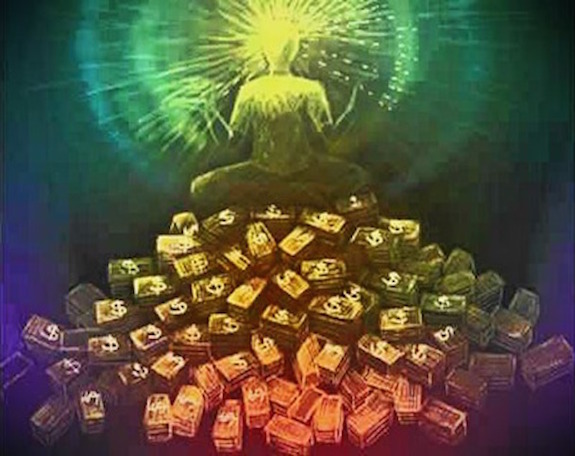by Jon Rappoport
“The focus on positive vs. negative thoughts is juvenile. It’s minor-league foolishness. And it leads people to obsess about their own minds. People aren’t passive magnets that attract and repel. That’s utter nonsense.” (The Underground, Jon Rappoport)
The law of attraction is stated in two ways.
First, positive thoughts attract positive results in life, and negative thoughts attract negative results. This is mainly a descriptive overview. It doesn’t apply to people who consciously do something to change their own thoughts. It’s a “philosophic” basis for understanding why people get what they get in life.
Therefore, one assumes, if a hundred thousand people are dying of thirst during a drought, they brought that on by thinking a whole lot of negative thoughts.
People who advocate the law of attraction tend to dislike such examples. They sometimes hedge their bets by asserting that external events (e.g., a drought) are quite real and they never claimed otherwise.
This produces a blurry line between events that “just happen” independent of what people are thinking, and events which are the result of negative or positive thoughts.
The second version of the law emphasizes that people, by changing the nature of their own thoughts, automatically affect what they get in life.
Certainly, this isn’t achieved by a person entering his own mind like a surgeon with a scalpel, pruning away the negative. The interior landscape is far too large, the flows of thought are too mercurial, and quite often, what seems like a successful surgery later turns out to be a dud: the old excised thoughts return.
A frontal attack on thought is like trying to wipe out air.
But there are meditations and repetitive affirmations. Some advocates of the law recommend them. Focus on thinking about what you truly want. Clarify such thoughts. Repeat them to yourself over and over. Affirm them. Or concentrate on an object of desire.
Doing this in a dispassionate way hardly calls up very much energy. It’s about as effective as trying to move forward in an active ocean while sitting in a paper boat and paddling with a soup spoon.
What, though, happens if you really believe you can get what you want by thinking positively about it over and over, or by focusing on it?
In that case, the driving engine is that belief.
And this is a whole other territory. Suppose you ardently believe that by visualizing a purple rose sitting on a boiled egg, you will become rich? Suppose you believe that a pink bulldog dropping down from the sky holding the string of a large balloon will give you a new house?
The purple rose and the boiled egg and pink bulldog aren’t the vital components. What’s vital is the underlying belief.
Is belief enough? Will it carry the freight?
There is no blanket conclusion possible. It all depends on who is believing and how they are believing and with what power they are believing, and with what conviction, and with what passion, and with what “belief in their belief.”
I have seen, and you have, too, I’m sure, people who achieve remarkable things based on what they believe.
And it doesn’t matter whether they are engaged in “changing their thoughts from negative to positive.” The law of attraction itself is irrelevant.
Furthermore, people who hold very strong beliefs act on them. They don’t sit in a room and power up that belief-engine and wait for something to happen.
They aren’t involved in some “snap-of-the-fingers” manifestation. They take massive and sustained action.
They live out their beliefs.
They create what wasn’t there before.
And in that act of creating, during a life lived, at some point along the line they experience remarkable collisions of events—the fancy label is synchronicity.
People and situations come to their aid.
You could call that magic. You could call it oobladee. It doesn’t matter.
In large numbers of people, the ordinary notion of the law of attraction helps to make them passive. They wait. They think. They re-think. They spin wheels.
Some of them begin to believe they have to banish the negative, and this process leads them into confusion and discomfort of a high order, because it doesn’t work. Thoughts, untold numbers of floating random thoughts, are the wrong target. They’re a dime a dozen, and there are billions of dozens. Who cares?
The idea of purifying one’s own thoughts is a dead-end alley in the long run.
It becomes a fetish.
And those who preach the “philosophy” are, sometimes, merely interested in controlling the flock. The more androidal members of the flock will, now and then, say, “Did you hear about Bob? He’s in the hospital. Too many negative thoughts.”
On a political level, this degenerates into “we suspect Jones just had an incorrect thought.”
Living a creative life through and by imagination is a whole other process. It’s the major leagues. It’s the expression of life-force in a voice that tears away the curtain of consensus reality.
Inventing what otherwise would never be there.
This kind of life quite naturally, without effort, defuses trillions of sputtering thoughts because they don’t matter. Negative? Positive? Makes no difference. It’s a puerile distinction.
In living a life through and by imagination, one’s past, one’s experiences, feelings, thoughts, memories—they’re all fuel for the fire. In that fire, a soul forges what he will invent, what new reality he will make.
He doesn’t diddle around with “positive and negative.”
Jon Rappoport is the author of three explosive collections, the Matrix Revealed, Exit From The Matrix, and Power Outside The Matrix. NoMoreFakeNews.com



